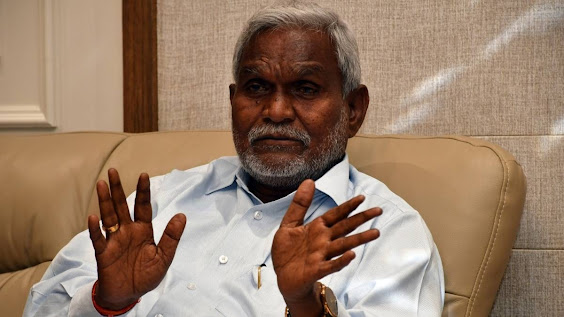BJP's Strategy of Leadership Changes and New Entrants Before Elections: Can Champai Soren Tilt Balance in BJP's Favour in Jharkhand?
Over the past few years, the Bharatiya Janata Party (BJP) has demonstrated a consistent strategy in assembly elections across several states. This approach involves either changing the sitting Chief Minister or bringing in prominent leaders from opposition parties.
For example, in Haryana, Naib Singh Saini replaced Manohar Lal Khattar as Chief Minister. In Gujarat, Bhupendra Patel took over from Vijay Rupani, while in Karnataka, Basavaraj Bommai replaced B.S. Yediyurappa. Similarly, Pushkar Singh Dhami was made Chief Minister of Uttarakhand, replacing Tirath Singh Rawat, and in Tripura, Manik Saha replaced Biplab Kumar Dev.
Moreover, the BJP has attracted influential leaders from opposition parties. Notable leaders such as Shubhendu Adhikari in West Bengal, Ashok Chavan in Maharashtra, Sunil Jakhar and Captain Amarinder Singh in Punjab, Jyotiraditya Scindia in Madhya Pradesh, and Himanta Biswa Sarma in Assam joined BJP from the Congress party during election seasons. These moves are believed to help the BJP mitigate the anti-incumbency factor and generate discussions about new leadership possibilities.
The latest addition to this trend is the former Jharkhand Chief Minister and Jharkhand Mukti Morcha (JMM) leader, Champai Soren, who is set to join the BJP on August 30. This raises the question: What is Champai Soren's political significance, and why is the BJP keen to include him?
Political Landscape of Jharkhand and the Role of Champai Soren
Jharkhand, a state with 81 assembly seats and 14 Lok Sabha seats, presents a unique political landscape. In the 2019 assembly elections, the JMM alliance managed to secure a majority with 47 seats, while the BJP could only win 25 seats. Additionally, the tribal population, which constitutes about 26% of the state's demographics, plays a crucial role in determining election outcomes. The BJP lost all five tribal-reserved seats in the 2024 Lok Sabha elections, reflecting the significance of this voting bloc.
Champai Soren is an influential leader of the Santhal tribe, one of the major tribal communities in Jharkhand. Hemant Soren, the current Chief Minister and a prominent leader of the JMM, also belongs to the Santhal tribe. Champai Soren, who was once a close associate of both Hemant Soren and Shibu Soren, has now emerged as a key figure for the BJP.
Importance of Kolhan Region and Tribal Influence
Champai Soren hails from the Kolhan region, which, according to the 2011 census, has the highest tribal population in Jharkhand, about 42%. This region has been a stronghold for the JMM alliance, which won 13 out of 14 assembly seats in the 2019 elections. In contrast, in the 2014 assembly elections, BJP's Raghubar Das was the only candidate in the Kolhan division who won by a margin of 70,000 votes. Out of the 14 seats in the division, Raghubar Das was the sole candidate to receive over one lakh votes.
The BJP’s strategy of including Champai Soren is aimed at strengthening its position in the Kolhan region and among the tribal electorate in general. By bringing in Soren, the BJP hopes to attract tribal voters and counter the JMM's influence in the area, particularly in regions with a substantial tribal population.
With these developments, it remains to be seen how the inclusion of Champai Soren will impact the political dynamics in Jharkhand, especially as the state prepares for upcoming elections.
(Prakash Pandey)

